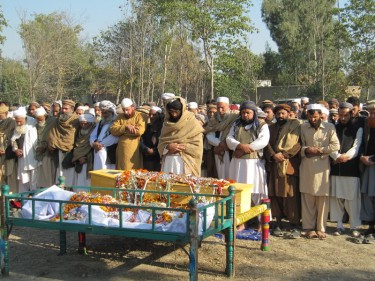This post is part of our International Relations & Security coverage.

Antipolio worker, Hilal Khan, is honored in Peshawar, Pakistan. By Musarratullah Jan (Dec 20, 2012) © Copyright Demotix
The huge rise in militancy across Pakistan (pdf), is also creating a number of hazards for aid workers. On New Year's Day gunmen on motorbikes ambushed and killed six female aid workers and a doctor in Khayber-Pakhtunkhwa province. It marked the latest in a series of attacks on polio vaccination charity workers.
On December 18, five female aid workers were killed as they were administering polio vaccinations. The following day another polio supervisor was killed along with her driver in the north-western town of Peshawar.
Naseer Memon, the Chief Executive of Strengthening Participatory Organization writes in an op-ed on Dawn:
Political instability, a fragile law and order situation, frail institutions and sociopolitical polarisation make the country a breeding ground for violent elements. These elements find humanitarian workers ‘soft targets’ because of their ubiquitous presence, especially in far-flung areas. A number of high-profile cases of kidnapping and killing of aid workers occurred in Pakistan in recent years, jeopardising the outreach of humanitarian organisations.
Targeting anti-polio efforts in Pakistan
Pakistan along with neighboring Afghanistan and Nigeria are among the few countries where Polio still remains endemic. In response, the United Nations, International Red Cross other humanitarian organizations have been campaigning for anti-polio efforts in various remote districts of Pakistan However, they are often targeted by militant groups and are even subject to conspiracy theories.
For instance, Ehsanullah Ehsan, a spokesperson for the Pakistani Taliban, claimed that in the aftermath of revelations that Shakil Afridi had used a fake vaccination program to gather information that led to the assasination of Osama bin Laden, many Pakistanis suspected anti-polio workers of being US agents.
A Pakistani Foreign Office official also suggested that fears by militants that NGO and health workers could be spies “may be spreading into other realms.” In September last year, Pakistani authorities ordered six aid workers from Save The Children to leave the country, allegedly for helping a spy agency.
Justin Wilder, author of a petition that demands an investigation into the murder of eight aid workers suggests:
Part of the problem is the reaction by religious leaders to the immunization program. Conservative clerics issued an announcement denouncing the UN program that helps administer oral and injected vaccinations to children in high-risk neighborhoods. There have been rumors spread among these communities that the program is a plot to sterilize Muslim children.
Walter Russell, a blogger for The American Interest magazine, blames Pakistani leaders for not doing enough:
As we saw in December, these attacks have been condemned by the public, and numerous Pakistani Muslims have been extremely vocal in their opposition to the evil perpetrated in the name of their religion. But despite the outcry, Pakistan’s leaders have proven completely powerless to stop things like this from happening. It’s a sad tragedy in one of the world’s saddest countries, and far too many Pakistanis will end up paying for it with their lives.
However, many humanitarian organizations are determined to remain in Pakistan despite the attacks. Shaheen Begum, who narrowly survived an attack by militants in mid-December, told the Sunday Telegraph:
Now, our work is becoming more dangerous with every passing day. I am still scared to be part of the campaign, but it would be a sign of cowardice if I withdraw my support, So I have decided to continue vaccinating children till the eradication of poliomyelitis from Pakistan… Though my family is extremely concerned about my safety, they allow me to protect other children from being crippled. Given the determination of the government and the health workers, it is possible that we can eradicate the disease once and for all.
Similarly, Bushra Arian of All Pakistan Lady Health Workers Association told PBS Newshour interview:
We go out door to door and risk our lives to save innocent children from being permanently handicapped.
For what? So that our coming generations turn out to be healthy. We work for our country, and we are being rewarded in the form of death. What kind of justice is this? Why are we targeted and killed?
 This post and its translations to Spanish, Arabic and French were commissioned by the International Security Network (ISN) as part of a partnership to seek out citizen voices on international relations and security issues worldwide. This post was first published on the ISN blog, see similar stories here.
This post and its translations to Spanish, Arabic and French were commissioned by the International Security Network (ISN) as part of a partnership to seek out citizen voices on international relations and security issues worldwide. This post was first published on the ISN blog, see similar stories here.







1 comment
“… We went into a camp to inoculate some children. We left the camp after we had inoculated the children for polio, and this old man came running after us and he was crying. He couldn’t see. We went back there, and they had come and hacked off every inoculated arm. There they were in a pile. A pile of little arms. And I remember… I… I… I cried, I wept like some grandmother. I wanted to tear my teeth out; I didn’t know what I wanted to do! …’ – character Colonel Kurtz in movie ‘Apocalypse Now’.
Kurtz comment was in regard with the polio vaccination program in then South Vietnam run by the US government.